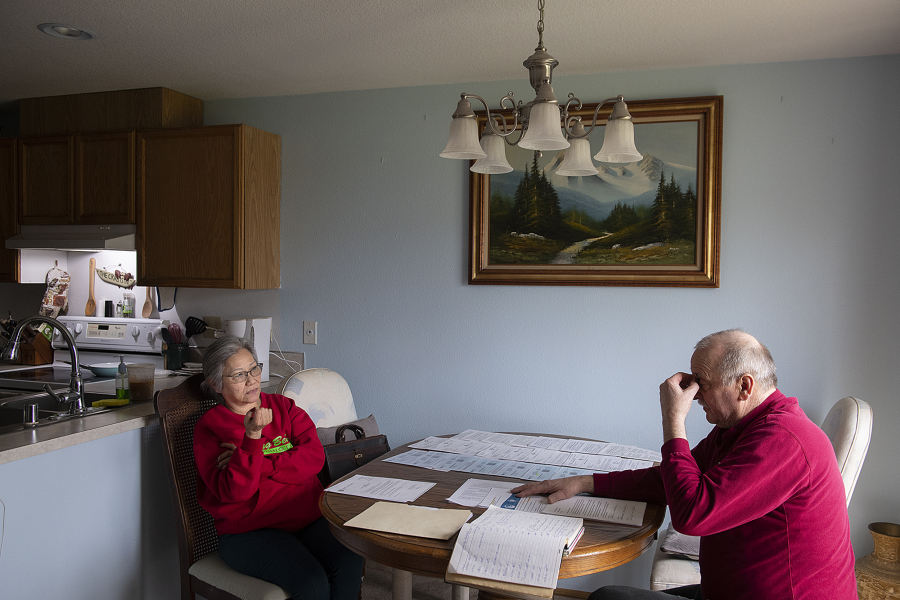Ronald and Houngming Christopher started renting out half of their duplex in Vancouver’s Cascade Highlands neighborhood five years ago, thinking it would be a good way to supplement their Social Security income.
Things were going relatively smoothly for the retired couple until the COVID-19 pandemic hit. Their tenants, a family with two kids and a third on the way, stopped paying rent after a combination of health issues and lack of day care options left them unable to work.
Government pandemic assistance helped pay the rent and utilities through last May. The tenants were able to scrape together enough money to pay another few months’ rent, though the payments were late, according to Ronald Christopher.
Now, the Christophers haven’t received any rent money since October, they said. Still struggling with unemployment, the tenants are doing what they can to find work and get by. They declined The Columbian’s interview request for fear that it would create further housing challenges for them going forward.
“We’re both 70 years old, living on Social Security,” Ronald Christopher said. “The only reason we’re still alive and functioning here is because we don’t have a mortgage right now.”
He has posted several 14-day eviction notices on his tenants’ door, but it’s largely an empty threat, he said. Washington’s tenant protections along with the steep costs landlords must pay for evictions mean the Christophers can’t find a way to get the renters out of their duplex.
“My family’s lived in Vancouver since the late 1800s. I don’t want to live in this town anymore,” Ronald Christopher said. “Who would want to have rental property where renters have more rights than the people that own the property?”
The pandemic has been hard on small landlords, especially now that COVID-19 rental-assistance programs have ended, according to Sue Denfeld, president of the Clark County Rental Association, which represents more than 9,000 small-landlord homes.
“They’re trying to maintain and keep going, but some of them just can’t,” Denfeld said. “There’s very, very little that can help the owners themselves.”
Small landlords are an important part of Clark County’s affordable rental market, Denfeld added.
“Some of the renters have the idea that (landlords) are bad people and they’re taking all of their money,” she said. “Actually what they’re doing, the smaller landlords, they’re doing everything that they can to pay down on their mortgage and to keep their rentals affordable. They’re the ones that are keeping the rentals affordable.”
Landlord frustrations
Ben Moody, housing programs managing attorney with the Clark County Volunteer Lawyers Program, gives legal advice to low-income tenants. From his perspective, tenant protections are crucial to keeping roofs over people’s heads.
“I am sympathetic to landlords who are struggling, but in a rather limited fashion,” Moody said. “Like any small business, that business can be particularly vulnerable to one deal gone bad. That’s what being a landlord is: It’s a business.”
According to Moody, the law is specifically intended to make eviction difficult to prevent homelessness.
“Economically and societally, homelessness is a major issue,” he said. “Beyond just the business impacts, there are knock-on effects, especially when children are involved — health impacts, education impacts, general societal and growth impacts.”
Under state legislation passed in April 2021, landlords must offer tenants a reasonable repayment plan before going to eviction court.
The Christophers charge their tenants $1,600 per month in rent. They made a repayment plan, but Ronald Christopher doesn’t see much point in it. “They’re not even paying rent. What makes you think they’re going to agree to the repayment?” he said.
They went to an attorney, who told them eviction could cost them several thousand dollars between legal fees and court costs, plus the additional loss of about $10,000 in unpaid rent.
“How are we going to pay the attorney fee if we don’t have renter money?” Houngming Christopher said. The couple has already spent more than $1,300 on attorney fees, according to their records.
Denfeld pointed out that for Clark County Rental Association members who have access to the association’s attorney — rather than using attorneys who charge by the hour — it should cost only between $900 and $1,200 to evict a tenant. “It goes through pretty quickly with them because they know all of the procedures. But still, it takes about six to eight weeks,” Denfeld said.
Moving out
In December, the Christophers made a last-ditch effort to get out of their lease: They put their house up for sale. They served their tenants with a 90-day notice, giving them until the end of March to move out. “This eliminates any kind of negotiation,” Ronald Christopher said.
The tenants have begun packing their things in preparation to move. But because the tenants are still living there, the Christophers haven’t had luck finding a buyer, Houngming Christopher said. “If you’ve got a good renter, the buyer’s gonna buy it right away,” she said. On the other hand, tenants behind on rent can make the house unattractive to buyers.
They’ve gotten some good offers, but then the price comes down due to their tenants’ rental history, she noted. “We can’t do anything about it.”
Denfeld said the rental association has a number of small-landlord members who are selling their properties because they can’t pay their mortgages and property taxes. This further reduces Clark County’s already limited inventory of affordable housing, she said.
“They are purchasing homes and providing affordable housing so they would have a retirement income when they do retire, but a number of them are not going to make it until retirement,” Denfeld said. “They’re gonna have to sell.”
Moody said he understands small landlords’ frustrations, but he thinks eviction protections are necessary to keep larger landlords from systematically pushing low-income tenants out of their homes. He sees the same apartment complexes and management companies in eviction court all the time, he said.
He also noted that landlords received a “massive benefit” from government assistance during the pandemic.
“The tens of millions of dollars that came into Clark County alone for rent assistance is not going into the pocket of the tenant. That money paid the landlords,” Moody said. “Landlords sometimes get tenants who get behind in the rent, and that is simply a fact of doing business.”




